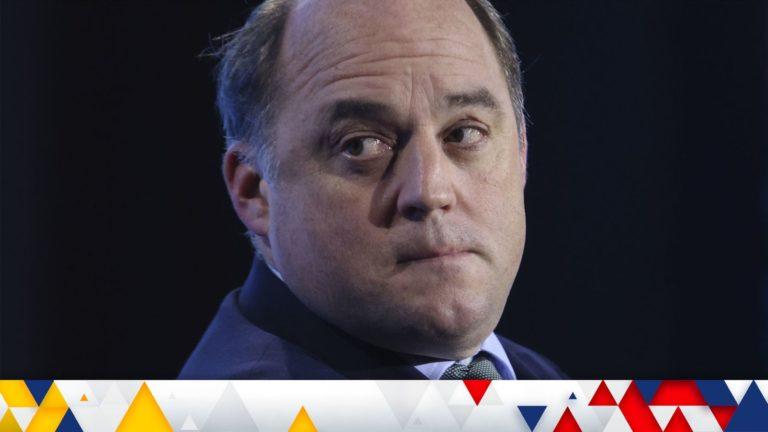US Breaks Ice, Russia Thaws

UK Defence Secretary Ben Wallace paid a secretive trip to US last week amid fears of a major Russian offensive in Ukraine
Fall ends and winter starts at the moment of the December solstice. But what if the Vernal Equinox arrives instead? In these times of climate change, anything is possible. There are subtle signs. Backyard birds are singing, butterflies and bumblebees are returning. How can one possibly miss it?
It is abundantly clear by now that it was the Ukraine war that drew the British Defence Secretary Ben Wallace post-haste to Washington on a secretive visit last Tuesday. Wallace met with US National Security Advisor Jake Sullivan followed up with meetings at the Pentagon, State Department and the spy agencies.
Two press releases from the Joe Biden Administration ensued —readout of Sullivan-Wallace meeting and a statement by President Biden, pinned on the exit of Liz Truss as UK Prime Minister, reaffirming the evergreen Anglo-American alliance. The striking thing was that neither statement spewed fire. Yet, the US and Britain are in the middle of a war that, according to Biden, is inching close to the Armageddon.
Upon his return to London, Wallace lost no time to make a statement on Ukraine at the House of Commons, on Thursday. Although not directly relating to his visit to Washington, Wallace’s statement radiated from his consultations with top US officials.
The statement largely adhered to the western triumphalist narrative of the war in Ukraine to the effect that “Russia’s ground campaign is being reversed. It is running out of modern long-range missiles and its military hierarchy is floundering. It is struggling to find junior officers to lead the rank and file.”
However, towards the end, Wallace abruptly changed tack by expressing appreciation of Russian Defence Minister Sergey Shoigu’s handling of the “potentially dangerous engagement” on September 29 between an RAF RC-135W Rivet Joint spy plane “on routine patrol” over the Black sea, which “interacted” with by two Russian armed Su-27 fighter aircraft when one of the Russian jets released a missile in the vicinity of the British plane “beyond visual range”. Wallace messaged the crucial importance of keeping communication lines open to Moscow. (The Hansard record is here.)
Significantly, a day later, the US Defence Secretary Lloyd Austin made a phone call to Shoigu, the first such contact in over five months. Apparently, Austin and Wallace have a common opinion that it is about time to resume conversations with Moscow.
The Pentagon readout merely said Austin “emphasised [to Shoigu] the importance of maintaining lines of communication amid the ongoing war against Ukraine.”
Indeed, Austin also took care to brief his Ukrainian counterpart Oleksii Reznikov about his initial call with Shoigu and “to reiterate the unwavering U.S. commitment to supporting Ukraine’s ability to counter Russia’s aggression.
“Secretary Austin also underscored the international community’s continued support in building Ukraine’s enduring strength and safeguarding Ukraine’s ability to defend itself in the future, as demonstrated by the security assistance commitments made by allies and partners at the most recent Ukraine Defense Contact Group meeting on October 12. The two leaders pledged to remain in close contact,” the Pentagon announced.
Curiously, two days later, on Sunday, it was Shoigu’s turn to make a follow up call to Austin. But this time around, the Pentagon readout clarified that “Secretary Austin rejected any pretext for Russian escalation and reaffirmed the value of continued communication amid Russia’s unlawful and unjustified war against Ukraine.”
And within an hour of receiving Shoigu’s call on Sunday, Austin got in touch on phone with Wallace “to reaffirm the US-UK defence relationship and the importance of transatlantic cooperation. Their conversation today was a continuation of their discussion at the Pentagon last week, which covered a wide range of shared defence and security priorities, including Ukraine.”
Presumably, the fog of war is thickening. Or, possibly, Austin smelt a rat as Shoigu had in the meanwhile on Sunday also made calls to three other NATO capitals — Paris, Ankara and London — where they discussed the situation in Ukraine “which is rapidly deteriorating,” and Shoigu conveyed “concerns about possible provocations by Ukraine with the use of a ‘dirty bomb.’” (here)
Importantly, the British readout said Wallace reiterated to Shoigu the UK’s “desire to de-escalate this conflict… and the UK stands ready to assist.”
It is entirely conceivable that all this could be the foreplay of a meeting between President Biden and President Putin on the sidelines of the G20 summit in Bali, Indonesia, on November 15-16, which seems increasingly likely.
But there is also the backdrop of a massive Russian military build up in the Kherson Region in southern Ukraine in the direction of Nikolaev (and, possibly, Odessa.) Contrary to the western media reports, the real picture is that on the western side of the Dnieper, Russians may have established a big troop presence in their tens of thousands with logistical back-up that keep the frontline fully supplied and reserve forces backing up. The Russian defence line is reportedly hardening all across the Kherson front with the deployment of armoured weaponry and tanks.
The Mayor of Nikolaev (also known as Mykolaiv) Oleksandr Syenkevych, an Ukrainian official, has ordered the evacuation of the civilian population in the city as heavy Russian bombardment continues. He told journalist Christian Amanpour that Russian tanks are already in the vicinity of the city’s airport. (here)
Evidently, things are moving toward a major escalation by mid-November. The capture of Nikolaev opens the road for Russian forces to advance toward Odessa 110 kms to the southwest. Control of Nikolaev and Odessa would mean control of Ukraine’s Black Sea coastline and denial of access to the NATO warships based in Romania and Bulgaria.
Evidently, despite the Western media’s triumphalist narrative, the big picture is turning against the US-UK axis. Wallace and Sullivan would have pondered over it, for sure.
Again, cracks are widening in the transatlantic system, as it dawns on European countries that they have fallen victim to the US’ grand strategy of hegemony. There is growing bitterness that American oil companies are making windfall profits.
The forthcoming visit by the German Chancellor Olaf Scholz to China is a massive statement in favour of globalisation in defiance of the Biden Administration’s strategy of “decoupling” from China. It signals a nuanced shift and return to pragmatism in Germany’s China policy. Official data shows that China-EU trade topped $800 billion for the first time in 2021 and two-way investment went beyond $270 billion in cumulative terms. In the first eight months of 2022, bilateral trade hit $575.22 billion, up by 8.8% and EU’s investment in China soared 121.5% year-on-year to $7.45 billion.
War fatigue is also becoming a compelling reality. The EU has pledged 1.5 billion euros for Ukraine, but how long can it carry such an annual burden when its own economies are in recession? The UK economy is on the verge of collapse.
Then, there is the “X” factor: sabotage of the Nord Stream pipelines. Putin wouldn’t have pointed finger at the US without corroborative evidence. The Kremlin said on Friday that the “truth” behind last month’s explosions on the Nord Stream gas pipelines “will surely surprise many in European countries if it was to be made public.”
The bottom line is that Austin broke the ice on Thursday in consultation with Wallace and with Biden’s approval. In a conciliatory tone, the White House also issued an extraordinary statement by Sullivan on Friday expressing appreciation of the “rapid and unanimous vote in support of the Security Council resolution proposed by Mexico and the United States, to impose sanctions measures and hold accountable those actors who are undermining stability in Haiti.”
Truly, isn’t it amazing that Russia voted for a US resolution imposing sanctions against yet another country in the Global South?
With the midterms just ahead and the near certainty of Donald Trump’s bid for second term as president, Biden’s own compass is going to be reset. Biden’s speech from the Roosevelt Room on Friday on deficit reduction projected the historicity of his “economic vision.”
Suffice it to say that when Shoigu mentioned Ukraine’s “dirty bomb” to three NATO ministers in Europe, he was only echoing what some thoughtful Americans have been saying lately, namely, that the US’ vital interest in avoiding war with nuclear-armed Russia “may soon clash with the strategic war goals of Ukraine—i.e., full retrieval of Crimea and the Donbas,” as Patrick Buchanan, the influential ideologue of the Republican Party, wrote in the American Conservative magazine over the weekend.
For sure, there is a waft of fresh, soft scents in the air. Does it presage an early spring? But to be a devil’s advocate, any suspension of the grand Russian offensive at this point may stir up a hornet’s nest in Moscow. Perhaps, that also forms part of the Anglo-American game plan.
MK Bhadrakumar is a former diplomat. He was India’s ambassador to Uzbekistan and Turkey. The views are personal.
Get the latest reports & analysis with people's perspective on Protests, movements & deep analytical videos, discussions of the current affairs in your Telegram app. Subscribe to NewsClick's Telegram channel & get Real-Time updates on stories, as they get published on our website.























